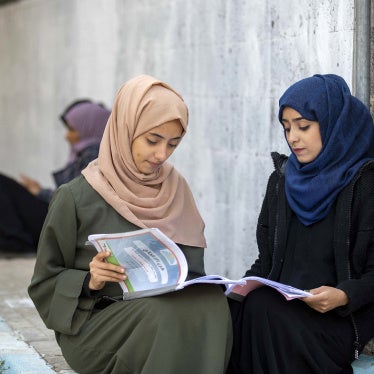H.R.H. Prince Sa'ud al-Faisal bin Abd al-‘Aziz Al Sa'ud
Minister of Foreign Affairs of the Kingdom of Saudi Arabia
Your Excellency,
On Wednesday, the Kingdom of Saudi Arabia's candidacy for the executive board of the new agency UN Women will be considered. In that context, we urge you to take immediate steps to implement the women's rights commitments Saudi Arabia made during the Universal Period Review of Saudi Arabia at the UN Human Rights Council in June 2009. At that review, Saudi Arabia accepted recommendations put forward by other UN member states to end the system of male guardianship over women, to give full legal identity to Saudi women, and to prohibit gender discrimination.
In the 17 months since that review, however, we see little, if any, movement to fulfill these important commitments, which Saudi Arabia made voluntarily in the presence of its peers. At the review, Saudi Arabia denied the existence of guardianship restrictions under Islamic law and told the Human Rights Council that "Islam guarantees a woman's right to conduct her affairs and enjoy her legal capacity." Those statements, however, are inconsistent with the reality faced by women in their daily lives in Saudi Arabia. Human Rights Watch has documented that Saudi officials continue to require women to obtain permission from male guardians to conduct their most basic affairs, like traveling or receiving medical care. In other cases studied by Human Rights Watch, male family members have obtained court approval to prevent, force, or dissolve marriages of their adult daughters.
In putting its name forward for a seat on the executive board of UN Women, Saudi Arabia has placed its record on women's rights issues in the spotlight. At this moment, it is critical that the Kingdom of Saudi Arabia take visible and concrete measures to fulfill its own commitments to reform. In particular, Saudi Arabia should establish an oversight mechanism to ensure that government agencies no longer request a guardian's permission for a woman to work, travel, study, marry, or gain access to health care or any public service. As it seeks a seat on UN Women's board this week, we urge Saudi Arabia to:
- Restate its commitment to end the system of male guardianship over women, to give full legal identity to Saudi women, and to prohibit gender discrimination;
- Announce publicly that it will set up an oversight mechanism to ensure that its commitments in this regard are met; and
- Commit itself to an explicit timetable for establishing the oversight mechanism and ending male guardianship over women.
Saudi Arabia has not fulfilled public promises by officials in 2009 to pass a law criminalizing domestic violence and to ban the marriage of young girls. Human Rights Watch has also documented several cases of alleged violence against women including incest, forced marriage, home imprisonment and domestic abuse, and the failure of Saudi women to access protection and justice in these cases. Human Rights Watch has brought these cases to the attention of the Human Rights Commission, a Saudi government entity. The commission has not effectively intervened to solve or address any of the cases brought to its attention, instructing women to "endure their troubles." We urge the Saudi government to strengthen the capacity of the commission to respond effectively to violations of women's human rights and to commit itself to addressing violence against women.
Kind regards,
Liesl Gerntholtz
Director, Women's Rights Division








